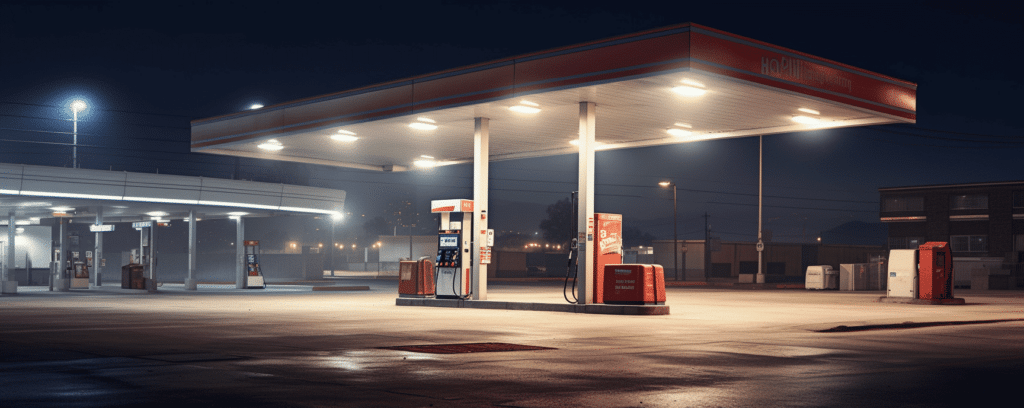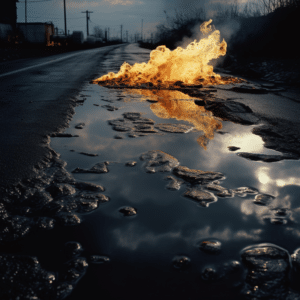Detecting and Avoiding Fuel Leaks from Gas That Burns
Last updated Wednesday, September 18th, 2024

Picture this: you’re driving down the road, and suddenly, you notice an overpowering smell of gasoline in your car. Panic sets in as you realize you could be in the midst of a gas leak. What do you do? How do you prevent this from happening again? Knowledge is power, and understanding how to detect and avoid fuel leaks from gas that burns is crucial for every driver.
Here we’ll explore the hazards associated with gas leaks, common causes, how to recognize the signs, steps to address a leak, and preventive measures to keep you and your vehicle safe.
The Hazards of Gas That Burns
Gas leaks pose serious risks, including fire and explosion hazards, negative environmental impact, and health concerns. Understanding these hazards is the first step toward keeping yourself and your vehicle safe from the dangers of leaking fuel and a leaking fuel tank.
Let’s investigate these hazards further.
Fire and explosion risks

Imagine a small leak in your engine compartment, where the heat from the engine could easily ignite the gasoline fumes. The resulting fire could quickly turn your vehicle into an inferno, endangering not only your own life but also the lives of others on the road. Undoubtedly, comprehending the fire and explosion risks linked to gas leaks is crucial.
Environmental impact
Gas leaks can cause significant harm to the environment, leading to soil and water pollution. When gasoline seeps into the ground, it contaminates water sources and negatively impacts the ecosystem. Additionally, gas leaks release potent greenhouse gases like carbon dioxide (CO2) and methane (CH4) into the atmosphere, contributing to air pollution and climate change.
Moreover, gas leaks can affect soil quality by altering physical, chemical, and biological processes in the soil. Methane leaks, for instance, can increase soil moisture content near the leak point, affecting the diffusion of gases and the concentration of contaminants in the soil. Exposure to methane-contaminated soil has even been linked to increased tree mortality.
Acknowledging the environmental impact of gas leaks highlights the need to deal with and prevent these problems promptly.
Health concerns
In addition to the environmental impact, gas leaks can present serious health concerns for individuals exposed to gas fumes. Short-term health effects of gas leak exposure include headaches, nausea, dizziness, fatigue, eye irritation, skin blisters, difficulty breathing, and flu-like symptoms. Prolonged exposure to carbon monoxide, a toxic substance often released in gas leaks, can cause lasting neurological problems such as headaches, fatigue, memory problems, vision changes, and difficulty breathing.
Respiratory issues associated with gas leaks may include:
- Coughing
- Wheezing
- Shortness of breath
- Irregular breathing
- Pneumonitis, an inflammation of the lungs
The potential health risks emphasize the need for quick response to gas leaks and implementing preventative measures to safeguard those who might be exposed.
Identifying Common Causes of Gas Leaks
To effectively prevent and address gas leaks, it’s essential to understand their common causes. Damaged fuel lines, faulty fuel injectors, and worn gas caps are the primary culprits behind gas leaks.
We will now examine each of these causes thoroughly.
Damaged fuel lines
Fuel lines play a major role in a vehicle. They are responsible for transferring gasoline from the tank to the engine. Over time, these lines can become damaged due to wear and tear, rust, or improper installation. When fuel lines are damaged, gasoline can leak onto the ground or into the engine compartment, posing a risk of fire and potential damage to the engine.
The deterioration of fuel lines may manifest as fuel leakage, the presence of fuel odor in the vehicle, engine performance issues, and fuel odor emanating from the car. Rust, in particular, can cause significant damage to the metal components of fuel lines, leading to clogged fuel injectors or carburetor jets, blocked filters, and damage to fuel pumps, regulators, and injectors.
Furthermore, improper installation of fuel lines can result in a leaking fuel line and potential fire hazards. Regularly inspecting and maintaining your vehicle’s fuel lines can help prevent gas leaks and keep your vehicle running smoothly.
Faulty fuel injectors
Fuel injectors are responsible for delivering atomized fuel precisely into the engine’s combustion chamber. When fuel injectors become clogged or obstructed with dirt and other foreign particles, they can leak. Clogging or debris buildup in the fuel injectors can lead to:
- Poor fuel atomization
- Uneven fuel distribution
- Engine misfires
- Decreased performance
Routine maintenance of injectors and using clean fuel is crucial to prevent fuel injector leaks. This not only helps to avoid gas leaks but also ensures optimal engine performance and fuel efficiency.
Worn gas caps
A worn gas cap is one that is not securely sealing the car’s gas tank, resulting in a leaking gas tank and fuel leaks. Gas caps play a crucial role in preventing liquid fuel or fuel vapors from escaping the fuel tank and entering the environment. Signs of a damaged or malfunctioning gas cap include a gas cap that is unable to be completely tightened or is loose, triggering the Check Engine Light, and an aroma of gasoline within the vehicle.
Maintaining a properly sealed gas cap and replacing it when needed can notably lower the risk of gas leaks. In fact, a properly sealed gas cap can help maintain the pressure in the tank and prevent fuel from leaking out.
Recognizing Signs of a Gas Leak

We will now examine these signs more closely.
Smell of gasoline
The unmistakable smell of gasoline is often the first sign of a gas leak. Gasoline has a distinct sweet or aromatic aroma, and if you notice this smell inside or outside your vehicle, it could indicate a leak. It’s essential to take action as soon as you detect the smell of gasoline, as ignoring it could lead to severe consequences, such as fires or explosions.
One should leave the area promptly and avoid any open flames or sparks if they smell gasoline. Turn off your car’s engine to prevent further fuel leakage and contact a professional mechanic or roadside assistance service to inspect and repair the leak.
Decreased fuel efficiency
A sudden drop in fuel efficiency could be a sign of a gas leak. Various factors can contribute to decreased fuel efficiency in vehicles, such as:
- Clogged or damaged fuel injectors
- Improper airflow due to dirty or clogged air filters
- Faulty oxygen sensors
- Misfiring or poorly performing spark plugs
- Incorrect tire pressure
However, a gas leak in the exhaust system close to the engine can have a significant impact on fuel economy and lead to fuel wastage.
A sudden drop in your vehicle’s fuel gauge reading, especially when it’s stationary, could be a sign of a gas leak. To determine if there is a leak, inspect the fuel gauge when parked for the night and check it again in the morning to observe if there is a lower amount of fuel in the gas tank.
Puddles under the vehicle
Gasoline puddles under your vehicle could be a sign of a gas leak. Gasoline puddles typically have a clear color and a thin consistency. If you notice a gasoline puddle under your car, take immediate steps to ensure safety, such as moving away from the puddle, avoiding open flames or sparks, and turning off the car’s engine to prevent further fuel leakage.
To clean up a gasoline puddle, follow these steps:
- Use absorbent materials like kitty litter or sand to soak up the gasoline, provided it is safe to do so.
- Dispose of the materials properly.
- Contact a professional mechanic or roadside assistance service to inspect and repair the fuel leak.
Steps to Address a Gas Leak
If you suspect a gas leak in your vehicle, it is crucial to act quickly and prioritize safety. This section outlines the steps to handle a gas leak, such as refraining from DIY repairs, consulting a professional, and emphasizing safety.
Do not attempt DIY repairs

Rather than jeopardizing your safety or inflicting further damage to your vehicle, it’s paramount to engage a licensed professional for gas leak repairs. Professionals have the specialized training, technical expertise, and familiarity with safety regulations and compliance necessary to repair gas leaks safely and effectively.
Seek professional help
When faced with a gas leak, it’s crucial to consult a professional mechanic to diagnose and rectify the problem. Mechanics possess the necessary skills, tools, and equipment to address gas leaks safely and efficiently. They can also provide valuable advice on preventive measures to avoid future gas leaks.
By delegating the repair of a gas leak to a professional, you ensure correct repair of your vehicle and prioritize the safety of yourself and others on the road. Remember, it’s better to invest in professional help than to risk a hazardous situation or costly repairs down the line.
Prioritize safety
Safety should always be your top priority when dealing with a suspected gas leak. Driving a vehicle with a known gas leak is not advisable, as gas is highly combustible and can lead to fires. If you suspect a gas leak, do not start the car, as it can ignite the fuel and cause a fire hazard.
Instead, take the necessary precautions by:
- Removing the vehicle from any enclosed areas
- Contacting your local gas company to report the suspected leak
- Seeking professional help to address the issue
By prioritizing safety, you can protect yourself, your vehicle, and others on the road from potential harm.
Preventing Gas Leaks
Prevention is always better than cure. This section covers the prevention of gas leaks through routine fuel system checks, appropriate gas cap maintenance, and the upkeep of fuel lines and injectors.
By taking these proactive measures, you can keep your vehicle running smoothly and safely.
Regular fuel system checks
Routine fuel system checks are crucial to preserve your vehicle’s fuel system integrity and prevent gas leaks. Essential components to inspect include:
- Fuel pump
- Fuel filters
- Fuel injectors
- Fuel lines and hoses
- Fuel tank
- Electrical connectors
Most mechanics suggest servicing the fuel injectors every 60,000 to 90,000 miles.
By regularly inspecting your vehicle’s fuel system, you can detect any signs of wear or damage early on, allowing you to address potential issues before they escalate into hazardous situations. Prevention through regular fuel system checks is a smart investment in your vehicle’s longevity and safety.
Proper gas cap care
The gas cap in your vehicle plays a key role in averting gas leaks by ensuring a tight seal on the fuel tank. To maintain the gas cap’s effectiveness, ensure it is properly sealed and replace it when necessary. Signs of a damaged or malfunctioning gas cap include a loose fit, triggering the Check Engine Light, and an aroma of gasoline within the vehicle.
By diligently maintaining your gas cap, you can significantly reduce the risk of gas leaks and help maintain the pressure in the tank, preventing fuel from leaking out. Proper gas cap care is a simple yet effective measure to prevent gas leaks in your vehicle.
Fuel line and injector maintenance
Maintaining your fuel lines and injectors clean and free from debris is crucial to prevent gas leaks. Clogged or obstructed fuel injectors can lead to poor fuel atomization, uneven fuel distribution, and engine misfires or decreased performance, which can result in leaks.
Regular maintenance of your fuel injectors can help prevent gas leaks and ensure optimal engine performance and fuel efficiency. Here are some tips to keep in mind:
- Service your fuel injectors every 15,000 to 30,000 miles.
- Check for any signs of leaks or damage to the fuel lines.
- Use high-quality fuel and additives to keep your injectors clean.
- Follow the manufacturer’s recommendations for fuel injector maintenance. By taking care of your fuel lines and injectors, you can safeguard your vehicle against potential gas leaks and keep it running smoothly.
Frequently Asked Questions
Why would my car be leaking gas?
Your car could be leaking gas due to clogged fuel injectors or faulty hoses in the fuel delivery system. This is often caused by mechanical impacts, rust, or wear on the hoses or incorrect installation. It’s important to have any leaking gas lines attended to as soon as possible.











